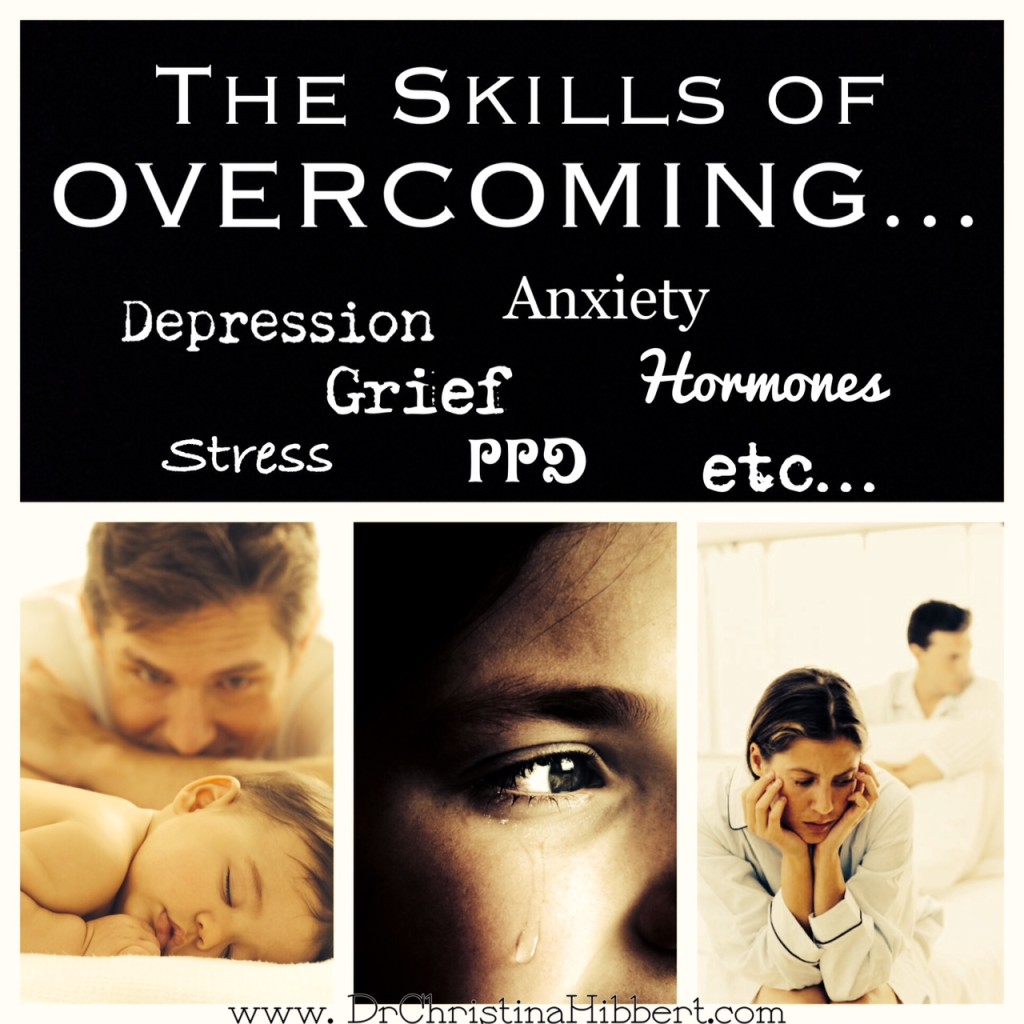
22 Jan 5 Skills of Overcoming…Depression, Grief, PPD, Hormones, Stress, etc., etc.
It’s important for all of us to learn the skills of overcoming–because life will test us. We will struggle and fall and have to learn to get back up. We will face hardships, loss, and physical and mental health challenges. And we need to be able to overcome these challenges, not only so we will feel again, but so we will be free to become our best self, experience the payoffs of personal growth, and flourish in life and love. That’s why my tagline is: Overcoming. Becoming. Flourishing.
5 Skills of Overcoming
Most of my professional work has focused on helping women, children, and men overcome something. Be it parenting issues, depression, anxiety, grief, relationship challenges, postpartum depression, adjustment to motherhood, hormone-related emotional struggles, etc.–there are five principles I’ve discovered that stand true no matter what we are overcoming. There are five skills of overcoming we can all begin developing today.
1) You must accept your situation. No matter the “problem,” the first step in overcoming is always acceptance. How can the alcoholic get clean if he fails to accept he’s an alcoholic? How can a family in grief overcome it if they fail to accept their need to grieve? It’s simple, yet not always easy–accepting what is. But it’s a crucial first step in moving beyond the “problem,” in overcoming it.
2) You must be willing to change and–if you choose to–grow. Many people say they want to overcome their challenges but aren’t willing to change in order to do so. I recall a client who had been seeing me for moderate depression for three months. Sensing she was not making progress, I brought it up in a session. She replied she didn’t think what I was doing was working for her. “Okay,” I said, “then let’s try something different.” I then explained a whole new approach to her depression, and how, if she was willing to work hard and I was willing to work hard, I believed she really could and would overcome. It was a “Dead Poet’s Society,” standing on the desk, kind of motivational moment that moved me to tears on her behalf. I paused and awaited her reply. “No, I guess I don’t want to do that,” she said, and quit therapy that day. I was stunned, but it helped me learn a lesson: You have to want to change if you ever want to overcome your problems. Overcoming is change, after all. And, you can not only change, you can grow through your struggles, too–if you choose to.
3) Create a plan for help, and incorporate outside support. Too many people just jump into the emotions of their problems and get lost, because they have no anchor, no plan, no support system. If you’re trying to make lasting change, you’re going to need a plan and support. Your plan might include self-help, like reading good books, taking courses on how to overcome your particular problem, vitamins and supplements, or talking with a friend or family member. It might also include outpatient professional treatment, like a support group, counseling, doctor’s visits or medication, or alternative treatment methods. More severe mental health struggles might include inpatient help in a hospital, treatment center, or other facility. Your plan should also include a strong support system, consisting of family, friends, community, and church members, who can encourage, teach, and be there for you. The important thing is to create the plan that is right for you, and use your supports. (More on Goal-Setting Success Skills, here)
*If you’re struggling with overcoming grief, watch this short video to get you started!
[stream provider=youtube flv=http%3A//www.youtube.com/watch%3Fv%3DEgr690jSVMQ img=x:/img.youtube.com/vi/Egr690jSVMQ/0.jpg embed=false share=false width=640 height=360 dock=true controlbar=over bandwidth=high autostart=false responsive=16:9 /]
4) Work hard. Give it your all. And remember, “It is work, but it is worth it.” Overcoming, by nature, is work. Hard work. But remind yourself of the choice that lies before you–“Either I do the hard work and get better, or I give up and stay the same.” One day at a time. One foot in front of the other. One healthy choice. One changed thought. It’s worth the hard work in the end.
5) Reevaluate the plan as needed, and be willing to go back to number one and start this “overcoming” process all over again, as many times as it takes. Change is like a spiral staircase, through which we move up and down. As we make mistakes, we learn. As we learn, we can choose new options and make better choices that will enable our plan to eventually work. The only “failure” is in giving up, or giving in to our troubles. Don’t let your troubles get the best of you. You’re better than that. You’re worth the work it will take to overcome. Someday, your overcoming will help you become your best self. And yes, if you stick with it, you will eventually flourish, too!
What helps you overcome, and what are you willing to give to become and flourish, too? I’d love to know what you think, so leave a comment, below!
For more on Overcoming, be sure to check out my bestselling memoir,
Available now on Amazon.com!
Looking for inspiration & support as you overcome, become, and flourish?
Join my “This is How We Grow” Personal Growth Group!
FREE. Online. Growth.
Don’t miss a thing!
SUBSCRIBE, below, “like” my Facebook pages (Dr. Christina Hibbert; This Is How We Grow) and follow me on Twitter,Pinterest, & Instagram!
You may manage your subscription options from your profile
Related Posts/Articles:
FEEL: How to cope with Powerful Emotions
Beyond “Happiness”: 10 Ways to Increase Joy
Women & Depression: 12 Facts Everyone Should Know
Postpartum Depression Treatment: What Everyone Should Know
Women’s Emotions: Part 3, The Menstrual Cycle & Mood
12 Facts on Depression & Medication
Parenting Skills Top Ten, #1: Do Your Own Work First
Discovering Self-Worth: Why is it so Hard to Love Ourselves?
The Positive Psychology of Flourishing! What is it? And Am I doing It?
Practicing Patience: 20 Ways to Be More Patient Today
“This Is How We Grow” Blog Hop: 10 Ways I Choose to Grow Each Day




I have overcome several things and it took a lot out of me so in order to get over the challenges I gave up control over what I had no control over and this helped me to handle the situation better. Overcoming is a process that takes time and as I healed I began to appreciate nature. I also mediate at times to inhale peace and exhale frustration. While I am concentrating on my in and out breath, I enjoy the stillness of the moment. I embrace the moment and this is a feeling that I record in my mind so that I can return to that moment.
Thank you for sharing some of your “plan for overcoming” with us. These are excellent tools that I think most people would benefit from–especially breathing and meditation. I think pretty much any “problem” would benefit from a little breathing and meditation as part of the “overcoming plan”. I also agree, overcoming takes time. For most “problems” we face, we will always have to work on overcoming if we want to maintain health. For instance, if I struggle with and overcome depression, I’ll always need to keep my plan in place to keep it at bay, and I’ll need to work on “overcoming” again, if it comes back. It’s a life-long process. All the more reason to work on our skills of overcoming, right? Thanks again for your insights!
Well, I have overcome some horrific things in my life and it took many years…the process seemed to be never ending. Often times I wondered, “maybe this is just how I am going to be the rest of my life”. But I persisted with therapy, small groups, yoga, bible study and running. All where great outlets and each helped in their own ways. However, like your client you mentioned in #2, my therapist asked me “You don’t really want to get better do you?” Wait! What? At first I was so angry at her question, “how dare her. Of course, I do. I pay her a lot of money for this help”….then, I sat with the question and tears fell…and I softly lowered my head and said “no. No I don’t”. BUT WHY? What in the heck? Then the greater thing happened, she asked me “What is staying sick serving you? What are you getting out of staying sick?” Again, wait!What? I didn’t want to stay sick…did I! On some levels, yes. It was in these questions, and digging that we uncovered a lot of hard work we had to do. The root, the stronghold, the fears of letting go to get well…to truly transform/change! I got there! Now…I face another great challenge with the loss of my mother a year 1/2 ago. This time…no therapist, no small group, no bible study, no support system and no family to really turn to. Just me…what I learned years ago in therapy , and prayer and the devotionals I do on my own, yoga and I box ;)…and at times, my husband. It’s been a challenging year but each season I’ve allow myself to feel the emotion, walk through the pain, the loss and keep going. They say “time heals all” I don’t believe this. Time doesn’t hold the power to heal anything. Only the work we do can help the hurt. Yet, I can’t image this pain every leaving me…there will always be an empty space in my heart for my mom. I had to let a lot things go with her passing and work through some tough conversations we had and know “she did love me…somewhere in her..she loved me” I had to let it go for it not to break me. Anyway, I can relate to all your 5 ways very well…thank you!
Susan, I appreciate you sharing these things with us here. It’s true, sometimes we THINK we want to change, but we really don’t–maybe we don’t feel ready yet, or we fear becoming different, or sometimes it’s just because we’re used to the way things are. It can be strangely comforting to stay the same–even if it’s a dark place. Yet, choosing to grow, as uncomfortable as it is, IS the only way to reach our full potential, and to live a life of meaning and joy. I also send blessings to you in your journey through grief. Grief is one thing that simply has to be experienced–there’s no easy way out. I like to say we have “holes” in us where our loved ones used to be. We move one, life continues, but little pieces of us are missing until we meet our loved ones again. Thanks again, and warmest wishes to you!
Hello Christina,
I always feel with most of your posts; especially this one; you make it sound easy.
I would like to comment on each of the stages:
1) You must accept your situation; this is provided you have real clarity as to what the situation is; this can also change through a period of time or different circumstances come into being.
2) You must be willing to change and–if you choose to–grow; change needs to be measured and there is no guarantee that the change you are after is in your best interests or that life is going to be better. I suspect this may be construed or viewed as resistance or a defense mechanism in order to avoid change. Change though is not always for the better. Occasionally there is something about accepting the hands you are dealt with in life and being able to appreciate the positives.
3) Create a plan for help, and incorporate outside support. This I believe is essential! However the plan needs to be manageable and broken down into easy stages/steps. Equally trust will need to develop between you and the helper. The plan cannot really be “pie in the sky” and needs to be realistic and something about being attainable or in your grasp.
4) Work hard. Give it your all. And remember, “It is work, but it is worth it.”
I am not convinced that hard work always achieves the best outcome. This is not to say that you can ever be sloppy. There is something about commitment and this needs to come from all parties concerned. Something about patience is also required and this can take time and effort.
5) Re-evaluate the plan as needed, and be willing to go back to number one and start this “overcoming” process all over again, as many times as it takes.
I agree with this entirely; however a caveat that maybe needs to be put in place is to bear in mind that persistence is required and by having no immediate results; does not necessarily imply failure. Failure can be seen as losing confidence, trust and worth and these qualities need to remain intact.
Recognition needs to be given for attempts as well as results.
Thanks Josie
I appreciate your insightful comment, Josie. You’re right–I make it sound easy. I think it is SIMPLE, but I know simple isn’t always easy. Overcoming anything is HARD WORK! I just want to make sure everyone knows I know that, too.
I also agree the plan must be manageable and broken down and taken slowly. My recent post on “Goal-Setting for Personal Growth Success” makes this point, I believe, and it’s an important point to be made!
I agree also that sometimes, hard work doesn’t lead to the best outcome. I write in my book, This Is How We Grow, about how sometimes we TRY so hard it doesn’t actually help us DO what we need to do. So, while I believe that overcoming is hard work, for sure, I also believe sometimes we need to take a step back, reevaluate, and make sure the work we’re doing is actually helping. And we really need to exercise patience, like you said. So very important.
Finally, your point about failure is spot on. The only “failure” is giving up. Results do not equal success–it’s the process that really matters.
Thank you again! Sending hugs to you in Scotland!